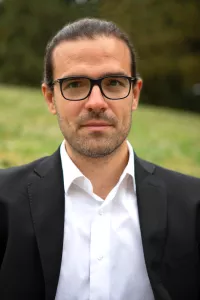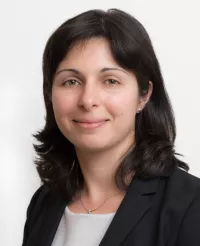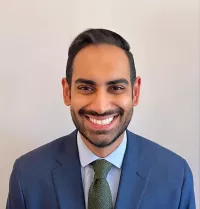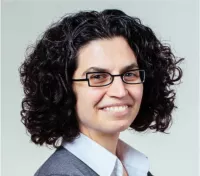Past PARC Fellows
2024 Fellow
PARC is pleased to announce the UCSF faculty member who has been selected as the recipient of the 2024 PARC Fellowship. Dr. Tommaso Di Ianni, Departments of Psychiatry & Behavioral Sciences and Radiology & Biomedical Imaging (joint appointment), School of Medicine, is the PARC Fellow of 2024-2025.
The PARC Fellowship, supported by an anonymous donor, provides an award to UCSF faculty conducting innovative pre-clinical and clinical research in pain, addiction, and the intersection thereof. Recipients of the award receive $100,000, which can be used flexibly to advance the fellow’s research. PARC is very pleased to support research that advances the mission of developing and testing new approaches to treat pain and addiction.
Dr. Tommaso Di Ianni’s research project is entitled,“Circuit mechanisms of opioid-mediated responses to subanesthetic ketamine.” Sub-anesthetic ketamine has gained much recent attention as a treatment for neuropsychiatric disorders including major depression, obsessive-compulsive disorder, and chronic pain. However, we still lack a complete understanding of ketamine’s mechanism of action, and recent evidence links ketamine's efficacy to activation of the opioid receptors in key regions of the brain's reward system. In this project, we will use a highly sensitive neuroimaging modality, functional ultrasound imaging, to quantify brain-wide interactions between subanesthetic ketamine and opioid receptors and to determine how these interactions modulate and are modulated by the reward system in a rodent model.
2023 Fellows
PARC is pleased to announce the three UCSF faculty who have been selected as recipients of the 2023 PARC Fellowships and the Painless Research Foundation Fellowship. Dr. Jeanne Paz, Department of Neurology, SOM, and Dr. Akshar Rambachan, Department of Medicine, SOM, are the PARC Fellows of 2023; Dr. Elyssa Margolis, Department of Neurology, SOM, is the recipient of the Painless Research Foundation Fellowship.
The PARC Fellowship, supported by an anonymous donor, provides awards to UCSF faculty conducting innovative pre-clinical and clinical research in pain, addiction, and the intersection thereof. Recipients of the award receive $55,000, which can be used flexibly to advance the fellow’s research. PARC is very pleased to support research that advances the mission of developing and testing new approaches to treat pain and addiction.
Through the generosity of the Painless Research Foundation, working with PARC leadership, a Painless Research Foundation Fellowship was established and awarded to Dr. Margolis. This $65,000 award supports pre-clinical research in pain and addiction and may be used flexibly by the fellow.
Dr. Paz’s research project is entitled, “Establishing a new mouse model of chronic central post-stroke pain after thalamic ischemic stroke.” Preclinical models of central post stroke pain, a state of debilitating constant or intermittent pain that can develop after a thalamic stroke, rely on inducing a hemorrhagic stroke despite over 85% of clinical strokes being ischemic. Therefore, we propose to develop a mouse model of central post stroke pain induced by a thalamic ischemic stroke to more adequately mimic clinical central post stroke pain and use this mouse model to identify the inflammatory markers associated with chronic pain development.
Jeanne Paz’s research goals focus on understanding the cellular and circuit mechanisms of adaptive and maladaptive neural synchronization in thalamocortical circuits. Her research program spans multiple levels of analysis: from the cell, to the circuit, to animal behavior, to unveil the maladaptive circuit dynamics in thalamocortical circuits after brain lesions such as stroke and traumatic brain injury. Her lab employs combinatorial optogenetics, in vivo and in vitro electrophysiology, longitudinal behavioral assessments, neuroanatomy, chronic imaging of vascular and neural networks in freely behaving rodents, laser photostimulation/circuit mapping, and signal processing. The long-term goal of the Paz lab is to improve the outcome for patients with neurological disorders by studying these in animal models and identifying potential targets for new therapeutic interventions.
Dr. Rambachan’s research project is entitled, “Characterizing the relationship between pain management practices and patient factors among hospitalized patients with substance use disorders.” There are clear barriers in our approach to assessing, documenting, and managing acute pain in the inpatient setting for patients with substance use disorders, including the perception of opioid abuse, different pain thresholds, lack of communication, and language barriers. We will study ten years of inpatient UCSF data for ~60,000 adults on medical services using linear mixed and cross-classified multilevel models to examine the relationship between patient characteristics, pain scores, and medication.
Dr. Rambachan is an Assistant Professor in the Division of Hospital Medicine, Department of Medicine. He completed his MD/MPH at Northwestern University, Internal Medicine Residency at Massachusetts General Hospital, and Fellowship in Academic Hospital Medicine at UCSF before joining as faculty in 2020. His research focuses on hospitalized patients, focusing on pain assessment and management, using both qualitative and quantitative research approaches.
Dr. Margolis’ research project is entitled, “Opioid responsive circuits in the lateral habenula.” The project investigates brain circuits for opioid pain relief but not reward. The population of lateral habenula neurons that are sensitive to mu opioid receptor activation project to the parabrachial nucleus, a brainstem region that signals pain. This funding will support the collection of initial behavior data to test the contribution of this habenula-to-parabrachial connection in nociception and pain relief.
I am a Professor in Residence with an Endowed Chair in Genetics of Addiction in the Department of Neurology. One of the major goals of the research in my lab is to improve treatments for pain and substance use disorder. To do this we study brain circuits that contribute to pain relief and drug reward, investigating how specific neurons respond to relevant behavioral stimuli and how specific molecules (including drugs and neurotransmitters) modulate activity in these critical neurons.
2022 Fellows
Dr. Marlene Martin, Department of Medicine, SOM, and Dr. Alison Giovanelli, Department of Pediatrics, SOM, are the PARC Fellows of 2022; Dr. Elyssa Margolis, Department of Neurology, SOM, is the recipient of the Painless Research Foundation Fellowship.
Dr. Martin’s research project is entitled, “San Francisco General Hospital Harm Reduction Program (SHaRP).” SHaRP is a mixed-methods study evaluating the implementation of an evidence-based harm reduction program at San Francisco General Hospital for patients with substance use disorders, particularly those requiring acute pain management. We will use electronic medical record data and in-depth interviews to identify how SHaRP influences general care and acute pain management for patients and staff.
Dr. Giovanelli’s research project is entitled, “Group CRAFT for Caregivers: Acceptability and impacts on youth treatment engagement and caregiver well-being.” The project is a pilot study of a modular skills-based group intervention, Community Reinforcement and Family Training (CRAFT), for caregivers of adolescents with substance use disorders (SUD). This study aims to evaluate the acceptability of group CRAFT for caregivers presenting to the Youth Outpatient Substance Use Program (YoSUP) in the UCSF Adolescent and Young Adult Medicine clinic, as well as intervention impacts on youth treatment engagement, caregiver self-efficacy and stress management, and the caregiver-adolescent relationship.






